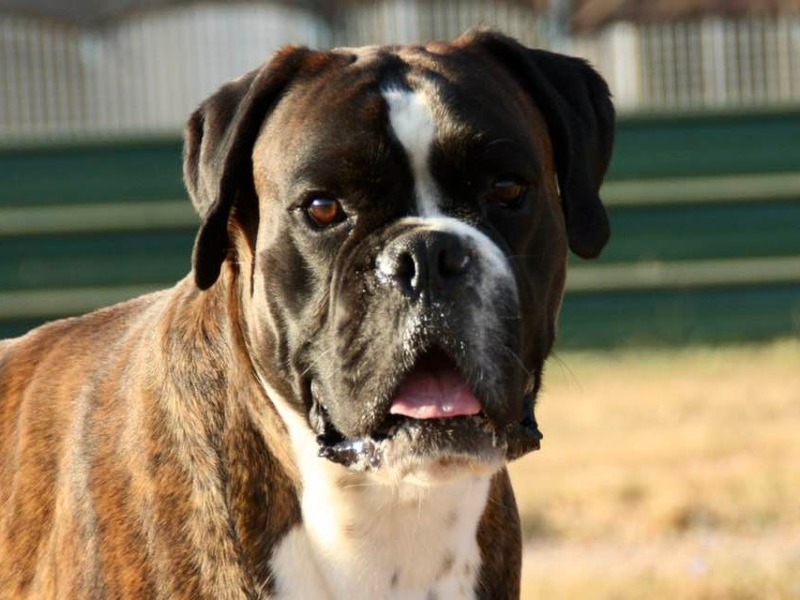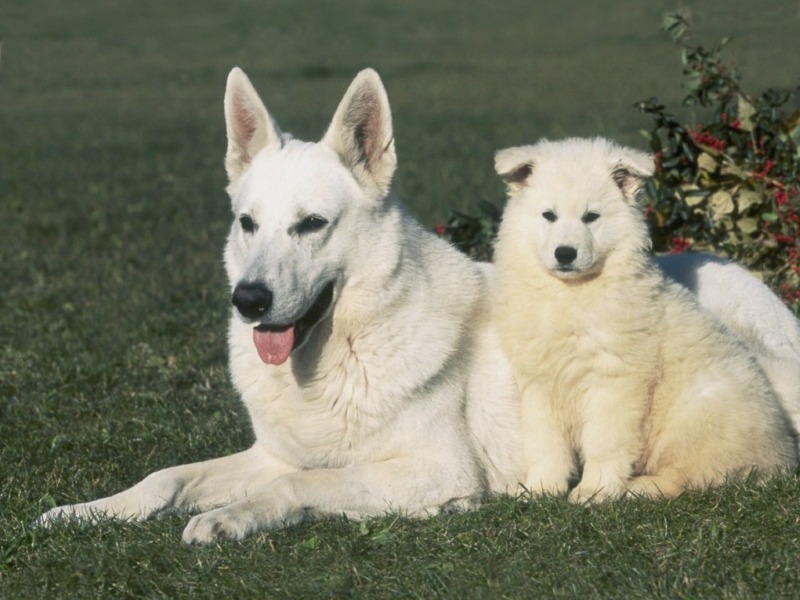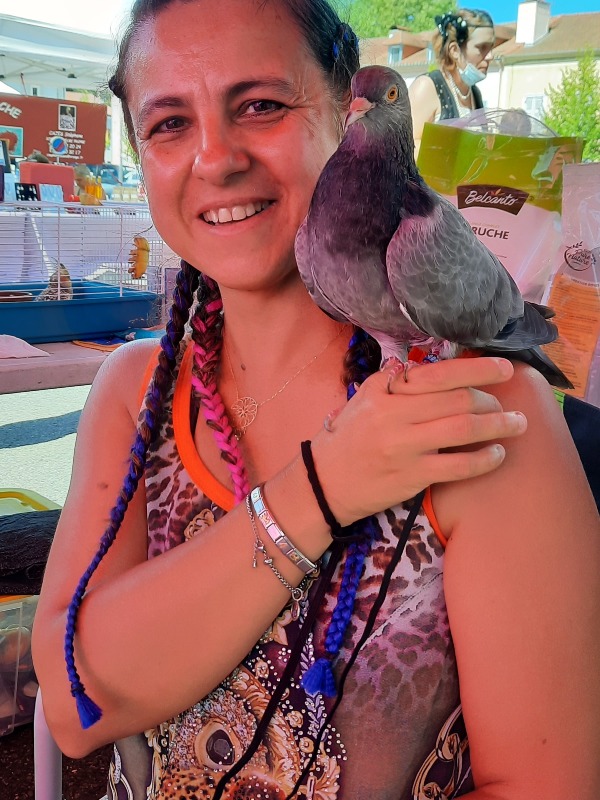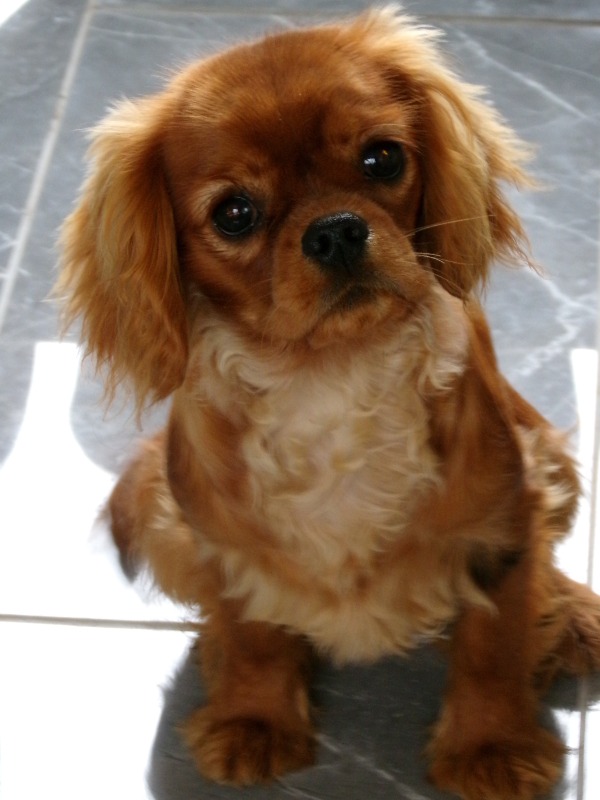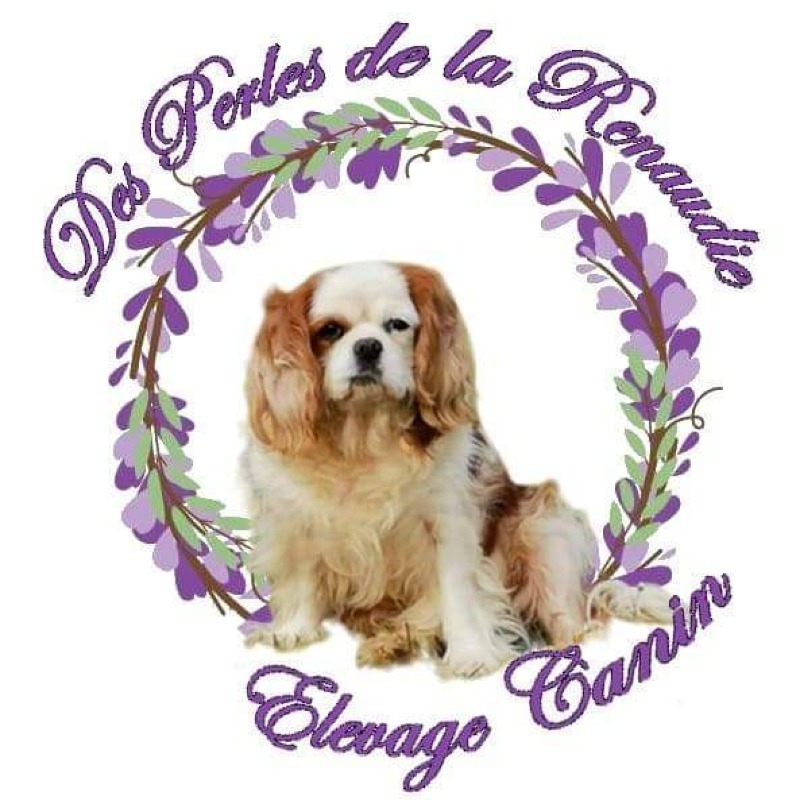Cavalier king charles spaniel
Autres noms : English toy spaniel
Discover the Cavalier King Charles Spaniel, a loving and joyful companion known for its gentle temperament and elegant beauty. Ideal for families and active individuals, this small dog with a playful personality will charm everyone who crosses its path.
Awareness of acquiring an animal
Adopting or breeding a dog is a responsibility that must be carefully considered. Dogs are loyal companions that require time, attention, and constant care. Whether for leisure, passion, or professional breeding, it is crucial to understand the specific needs of each breed. Provide them with a loving and stimulating environment, and avoid any impulsive acquisition that could harm their well-being. Be a vigilant and committed owner for a happy and healthy companion.
To learn more about animal welfare, we invite you to consult our FAQ by clicking the button below:
Origins and history
The Cavalier King Charles Spaniel is a dog breed that has its origins in Europe, specifically in England, during the 17th century. This breed is the result of the crossbreeding between small spaniels and toy-type dogs, aiming to create a small companion appreciated by the nobility of the time. Popularized by the royal court, particularly during the reign of Charles II, this breed quickly gained notoriety, becoming a symbol of prestige and elegance.
Over the years, the Cavalier King Charles Spaniel has undergone morphological changes. By the end of the 19th century, the emergence of smaller breeds led to a reevaluation of the breed standard. Breeders then sought to preserve certain characteristics, such as the gentle and friendly expression, as well as the affectionate personality. This led to the establishment of stricter breed standards in the 20th century, ensuring the continuity of the desired traits.
Today, the Cavalier King Charles Spaniel is appreciated not only for its charming appearance but also for its sociable temperament. This dog is an excellent family companion, known for its intelligence and ease of learning. Affectionate and devoted, it can adapt to different environments, making it a popular choice among dog lovers worldwide.
Physical characteristics
The Cavalier King Charles Spaniel is a small to medium-sized dog, typically measuring between 30 and 33 cm at the shoulder. Its ideal weight ranges from 5 to 8 kg. This dog has a well-proportioned body, with a solid yet light bone structure, which gives it both elegance and agility. Its movement is fluid, characterized by a joyful and dynamic gait.
One of the most remarkable characteristics of this breed is its head, which is round with a slightly rounded skull. Its large, round, bright, and expressive eyes give it a sweet and affectionate expression. They are generally dark in color, contributing to its friendly and warm demeanor. The long, hanging ears are covered with silky fur that gracefully falls along the cheeks.
The coat is smooth, silky, and moderately long, often wavy in certain areas of the body. Typical colors include black and white, orange and white, ruby, and Blenheim. This mix of colors adds to the visual charm of this breed. The Cavalier King Charles Spaniel also has a medium-length tail that is slightly curved at the tip, often carried joyfully as it moves.
Character
The Cavalier King Charles Spaniel is a small dog known for its affectionate and sociable nature. These dogs are particularly attached to their families and love to spend time with their owners. This loving nature makes them often very tolerant, even towards children or other pets. Their propensity to seek human companionship makes them ideal companions for those looking for a loyal pet.
In addition to their affection, these dogs possess a natural curiosity that drives them to explore their surroundings. They are also known for their intelligence, which makes them relatively easy to train. However, their desire to be attuned to their owners can sometimes manifest as a tendency to be a bit temperamental, especially if they are not properly socialized from a young age.
Finally, Cavaliers are sensitive dogs that respond well to positive reinforcement but can become stressed by overly strict training methods. Their playful temperament and kindness make them perfect companions for those seeking warm and enjoyable interaction on a daily basis.
Life expectancy
The life expectancy of a Cavalier King Charles Spaniel typically ranges from 12 to 15 years. This lifespan can vary depending on various factors, including genetics, healthcare, diet, and lifestyle. Dogs of this breed are often healthy due to proper care, which can contribute to a longer and more fulfilling life.
However, Cavaliers may be predisposed to certain hereditary diseases, such as mitral disease, which affects the heart, or syringomyelia, a neurological condition. These health issues can reduce their life expectancy if not detected and treated in time. Therefore, regular veterinary visits and special attention to their well-being are essential to ensure a long and healthy life.
Additionally, the Cavalier's lifestyle will also influence its longevity. A balanced diet, sufficient exercise, and a stimulating environment are key elements that contribute to their overall well-being. Owners should therefore actively engage in the care of their pets to maximize their life expectancy.
Exercise and activity needs
The Cavalier King Charles Spaniel is a breed of dog that has a fair amount of energy. It is important to meet its exercise needs to ensure both its physical and mental health. Due to its small to medium size, the Cavalier can adapt to different environments, but it still requires regular activity to prevent obesity and other health issues.
In general, a Cavalier King Charles Spaniel needs at least 30 minutes to an hour of exercise each day. This can include walks, games in the garden, or free play in enclosed spaces. Interactive games, such as fetching balls or toys, are particularly enjoyed activities that stimulate its mind while promoting exercise.
Furthermore, the Cavalier is a sociable dog that appreciates the company of humans and other animals. Participating in group walks or canine activities can be beneficial for its overall well-being. Outdoor games also encourage social interactions and strengthen the bond with its owner. Thus, a combination of physical exercise, mental stimulation, and social interactions is ideal for a happy and healthy Cavalier King Charles Spaniel.
Recommended diet
The Cavalier King Charles Spaniel is a dog breed that requires special attention to its diet. Due to its small to medium size and metabolism, it is essential to provide high-quality food tailored to its specific needs. A balanced diet should include quality proteins such as chicken, fish, or lamb, which promote good muscle development and a healthy coat.
Complex carbohydrates, such as brown rice or sweet potatoes, also serve as a sustainable energy source. It is best to avoid foods that contain excessive fillers or by-products, as these can harm the animal's health. Enriching its diet with omega-3 and omega-6 fatty acids, found in oils like fish oil or flaxseed oil, can contribute to the health of the skin and coat.
Hydration plays a crucial role, so it's important to ensure that the Cavalier King Charles Spaniel always has access to fresh water. Additionally, it is advisable to divide meals into small portions throughout the day to better manage its weight and prevent digestion issues. Regularly monitor its weight and consult a veterinarian to adjust its diet if necessary, as some individuals may be prone to obesity, which can lead to health complications.
Training and obedience
Training and education of King Charles Spaniels require a gentle and patient approach. This breed is particularly sensitive and responds better to positive methods. Rewarding with treats, vocal praise, and petting is often more effective than punitive approaches. Establishing a trusting bond is crucial, as these dogs are very attached to their owners.
It is important to start training at a young age. Puppies are particularly receptive to learning and benefit from early socialization. Exposing these dogs to different environments, people, and animals promotes healthy socialization and prevents fearful or aggressive behaviors in adulthood.
King Charles Spaniels enjoy playful activities. Incorporating play into training sessions can make learning more enjoyable. Simple exercises, such as recall or "sit," are essential basics to teach.
Finally, consistency is key. Using the same commands and gestures reinforces learning and helps the dog understand what is expected of them. Due to their affectionate nature, these dogs thrive in an environment where love and education go hand in hand.
Behavior with children
The Cavalier King Charles Spaniel is known for its friendly and affectionate temperament, making it an excellent companion for children. This dog is naturally sociable, and its gentle personality allows for a harmonious relationship with the youngest ones. Its patience and tolerance make it an ideal pet for families, as it is generally inclined to interact with kids without showing signs of aggression.
The breed has moderate energy, which allows it to adapt to different activity levels of children. Whether it’s for calm indoor play or outdoor walks, the Cavalier King Charles Spaniel knows how to adjust. However, it is essential to teach children to treat the animal with respect and gentleness. Supervision during interactions is also recommended, especially with very young children, to avoid sudden movements that the dog might misinterpret.
In conclusion, the Cavalier King Charles Spaniel is an excellent choice for families with children, provided that interactions are guided to ensure everyone's well-being. This dog seeks only affection and will prove to be an exceptional companion for creating cherished family memories.
Compatibility with Other Animals
The Cavalier King Charles Spaniel is renowned for its gentle and sociable nature, making it an excellent companion for families and other pets. This breed is generally very friendly, which makes it easy to integrate them into a household that already includes other animals, such as cats and dogs of different breeds. Their playful temperament and tendency to be curious encourage positive interactions with other animals, provided that these introductions are made gradually and in a controlled manner.
However, it is essential to consider the individual personalities of the animals. Each dog has its own character, and differing temperaments can lead to conflicts. Cavalier King Charles Spaniels tend to be very playful and exuberant dogs, which can sometimes make them come off as intrusive to shyer animals. Early socialization is crucial to ensure harmonious relationships.
In summary, this breed is generally compatible with other pets, but it is important to monitor their interactions and promote positive introductions to ensure a peaceful coexistence. A calm and reassuring environment will help everyone adjust and accept each other mutually.
Grooming needs
The Cavalier King Charles Spaniel is a dog breed that requires regular grooming due to its long and silky coat. It is advisable to brush your dog at least two to three times a week to avoid knots and tangles. Frequent brushing also helps reduce shedding, an important aspect for keeping your home clean.
In terms of bathing, monthly grooming is recommended, but it can be adjusted according to the individual needs of the dog, especially if it gets dirty more quickly during activities. Using a mild shampoo specifically designed for dogs is crucial for maintaining the health of their skin and coat.
Ear maintenance is also essential, as Cavaliers have long, floppy ears that can trap moisture and dirt. Regular inspections are necessary to prevent infections. Additionally, it is advisable to trim the nails monthly and monitor dental hygiene by brushing the teeth regularly to prevent dental issues. Consistent attention to grooming will ensure a happy and healthy Cavalier.
Health
The Cavalier King Charles Spaniel is a charming breed, but it is prone to several specific health issues. Due to its skull structure, these dogs can develop respiratory problems, particularly because of brachycephaly, which restricts airflow. This can lead to difficulties in breathing, especially during physical exertion or in hot weather.
Heart problems represent another major concern. Degenerative valve disease is common and can lead to heart failure. Owners need to stay vigilant for symptoms such as coughing, quick fatigue, and episodes of fainting. Regular check-ups with the veterinarian can help detect these conditions early.
Eye problems, such as cataracts and lens luxation, are also common. Regular ophthalmological examinations can help anticipate these issues and address them accordingly.
Finally, the Cavalier King Charles Spaniel is sensitive to joint pain, which can be caused by congenital malformations. Regular orthopedic check-ups and weight management are essential to maintain their health and well-being. Taking these precautions contributes to ensuring a long and happy life for these affectionate companions.
Environment and habitat
The Cavalier King Charles Spaniel is a dog breed that thrives in a warm and loving home environment. This small dog, with its silky coat and large ears, is well-suited for apartment living, as long as it receives daily walks. It is important to provide them with spaces to expend energy, as these dogs are active and social. Regular outings to parks or suitable areas are ideal for their physical and mental well-being.
Regarding their habitat, their need for interaction with humans makes them sensitive to isolation. They prefer to be with their family and easily adapt to different lifestyles. A house with a garden is a plus, but a spacious apartment can also work, as long as they receive the necessary attention and exercise. This dog excels in environments where it can roam freely and enjoy the company of its owners, thereby enhancing its affectionate and loyal character.
Name ideas
Choosing a name for your Cavalier King Charles Spaniel is an important step that reflects their personality and character. A good name should be short and easy to pronounce so that your dog can learn it easily. It is essential to choose a name that does not sound like common commands to avoid any confusion. Also, think about the meaning or history behind the name, as this can strengthen your bond with your dog. Finally, consider a name that will suit your dog at all stages of their life, as cute nicknames may become less appropriate as they grow up.
Here are about fifteen name suggestions for your Cavalier King Charles Spaniel:
Chester, Bella, Coco, Winston, Louna, Oliver, Daisy, Milo, Chérie, Max, Pippa, Hugo, Zoé, Nino, and Ruby.
These names capture the nobility, charm, and affectionate nature of this breed. Take the time to try out a few of these names to see which one best fits your dog's personality.
Average purchase price
The purchase price of a purebred Cavalier King Charles Spaniel varies depending on several factors. In general, the average cost ranges between 1200 and 2500 euros. This amount can fluctuate based on the breeder, lineage, geographical location, and the titles of the parents.
Renowned breeders, who devote a lot of time to selecting their dogs and ensuring their health, may charge higher prices. Puppies from award-winning lines or those that have been shown in competitions can reach a maximum price. Additionally, the demand for this breed plays a significant role in the pricing. Being a highly valued dog for its affectionate temperament and compact size, popularity contributes to keeping prices relatively high.
It is also important to consider the additional costs associated with bringing a new dog into your home, such as vaccinations, sterilization, food, and veterinary care. Thus, while the initial cost may seem accessible, it is essential to take into account the long-term financial commitment involved in adopting a Cavalier King Charles Spaniel.
Expenses
Owning a Cavalier King Charles Spaniel involves several monthly expenses to ensure its well-being. On average, these expenses can be estimated at around 100 to 200 euros per month.
First of all, food represents a significant portion of the budget. For a quality diet, expect to spend between 30 and 70 euros per month, depending on the brands and dietary needs. It is essential to choose kibble that is suitable for the breed and age of the dog to ensure its health.
Next, regular veterinary care, including vaccinations, parasite treatments, and consultations, can amount to around 20 to 50 euros monthly, depending on specific medical needs. Pet health insurance can also be considered to cover any unforeseen expenses.
Finally, don’t forget about grooming, toys, and accessories, which can add up to between 20 and 40 euros per month. Taking all these expenses into account, it's important to plan an adequate budget to ensure a healthy and happy life for your companion.
Destination and usage
The Cavalier King Charles Spaniel is prized as a pet due to its gentle and affectionate temperament. These dogs are often adopted by families, couples, and even elderly individuals because of their adaptability to various living environments, whether apartments or houses with gardens.
One common use for this breed is as a companion for leisure activities. Their sociable nature and moderate energy make them perfect for accompanying their owners on walks, outings to the park, or outdoor activities. Their small size allows for great flexibility, making travel by car or on trips much easier.
Moreover, the Cavalier King Charles Spaniel is often chosen for its close bond with its owners. They are known for their ability to create strong emotional attachments and are recognized for bringing comfort and joy. Their presence contributes to the psychological well-being of their owners, helping to reduce stress and anxiety.
Finally, this breed is ideal for those seeking an affectionate and playful pet, ready to partake in family activities while adding a touch of sweetness and happiness to daily life.
Legislation and regulation
The legislation and regulations concerning the Cavalier King Charles Spaniel breed vary significantly from country to country. In many European countries, this breed is generally well-accepted, with clubs and organizations promoting high standards of health and welfare. Dog ownership laws often emphasize the responsibility of owners, particularly regarding veterinary care and socialization.
In contrast, some countries enforce strict regulations regarding breeding. Laws may require breeders to register with official associations and adhere to rigorous health standards to prevent genetic diseases common to this breed. In some cases, regular inspections are carried out to ensure the well-being of the animals.
Other countries, particularly in certain regions of America and Asia, may have more restrictive attitudes towards breeds deemed at risk, requiring permits or imposing size and behavior restrictions. This regulatory diversity reflects different cultural perceptions and attitudes towards pets, highlighting the importance of raising public awareness about the specific needs of this breed.
Official recognition
The Cavalier King Charles Spaniel is recognized by numerous canine organizations around the world, including kennel clubs and breed associations. In Europe, the Fédération Cynologique Internationale (FCI) has assigned it group number 9, which includes the group of companion and toy dogs. This status provides a certain legitimacy to the breed and establishes precise standards regarding appearance and behavior.
In the United States, the American Kennel Club (AKC) also grants official recognition to the Cavalier King Charles Spaniel, classifying it within the toy group. This recognition allows breeders to meet quality criteria and enables owners to practice responsible breeding and care.
In other regions of the world, such as Australia and Canada, national canine organizations recognize the breed, thus ensuring its role in dog shows and competitions. This recognition contributes to the breed's growing popularity, supported by its endearing qualities and friendly temperament. The protection of the breed through rigorous standards helps to preserve its health and well-being in the long term.
Pedigrees
To obtain a pedigree for a Cavalier King Charles Spaniel, it is essential to refer to recognized canine organizations that maintain breed registers and issue certificates of ancestry. In France, the Livre des Origines Français (LOF) is the primary organization that registers purebred dogs. Breeders must ensure that their breedings comply with the breed standards to produce puppies with a pedigree.
At the international level, the Fédération Cynologique Internationale (FCI) is the entity that oversees the standards for each breed, including the Cavalier King Charles Spaniel. Dogs registered by clubs affiliated with the FCI can obtain a pedigree recognized in many countries. This ensures that quality and health standards are met and that the ancestry can be verified.
Breed clubs, such as the Club Français du Cavalier King Charles Spaniel, also provide valuable resources for owners and breeders. These clubs can facilitate puppy registration and provide information on reputable breeders, affiliation offices, and canine events where dogs can be showcased. They are often a source of advice on health and well-being for the breed, thereby reinforcing the importance of a good pedigree for the selection of future breeders.
Prohibitions
The Cavalier King Charles Spaniel is a breed of dog often appreciated for its friendly temperament and charming appearance. However, legislation regarding dog breeds varies significantly from country to country, and some regions may impose restrictions or even bans on their ownership.
In several European countries, dog breed laws primarily focus on breeds considered dangerous. The Cavalier King Charles Spaniel is generally not included in this classification, allowing its owners to keep them without legal constraints. However, some countries impose conditions regarding owner responsibility, and dogs must be well-socialized and trained.
In other regions, concerns related to the health of certain breeds may also influence regulations. Although the Cavalier King Charles Spaniel is not considered a high-risk breed, it suffers from specific health issues, such as heart disease, prompting some countries to promote ethical breeding practices. Thus, restrictions may be implemented to protect animal welfare.
In summary, while this breed is not commonly prohibited, owners should remain informed about local laws and promote responsible breeding standards to ensure the health and well-being of the dogs.
Breeders of Cavalier king charles spaniel
Want to see more breeders of Cavalier king charles spaniel?
Check out the page of our directory listing all breeders of Cavalier king charles spanielClassified Ads of cavalier king charles spaniel
No of cavalier king charles spaniel classified ads are available on Preeders.
If you’re a breeder, sign up for free now and be the first to post a classified ad
Breed clubs of cavalier king charles spaniel
No of cavalier king charles spaniel breed clubs are currently registered on Preeders.
If you would like to highlight your breed club, sign up for free now and be the first to appear on this page.

